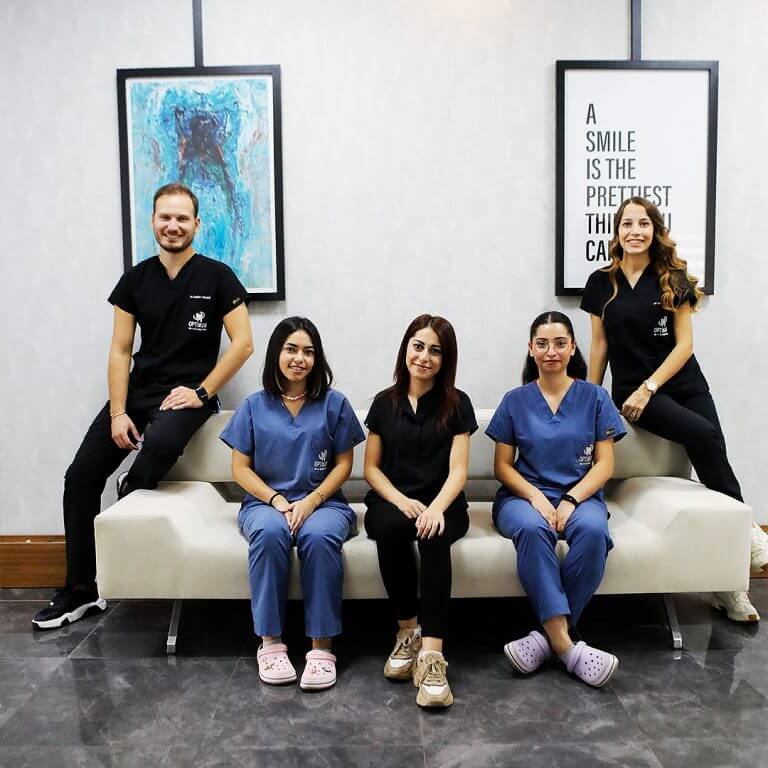Pediatric Dental
Have a question? Just send our admin team a message and we’ll get back to you as quickly as possible.
How do I brush my baby's teeth?
Newborns should use a toothbrush with soft bristles and a tiny head, preferably one developed for infants. Brushing your teeth at least once a day, before bed, will eliminate plaque bacteria that can contribute to decay.
When should my child have his or her first dental visit?
The basic guideline is “first visit by first birthday.” To avoid dental issues, your kid should see a pediatric dentist as soon as his or her first tooth shows, which is normally between 6 and 12 months of age, but no later than his or her first birthday.
What exactly is infant bottle teeth decay, and how can I avoid it?
Baby bottle teeth decay is a fast decay pattern associated with extended breastfeeding. It occurs when a youngster falls asleep while breast- or bottle-feeding. During sleep, the flow of saliva decreases, as does the mouth’s normal self-cleaning process. Avoid putting anything other than water in your child’s bedtime bottle or breastfeeding them to sleep. As your kid approaches their first birthday, encourage them to drink from a cup.
Why should I take my child to a pediatric dentist rather than our usual family dentist?
Pediatric dentistry is a branch of dentistry that focuses on the oral health of children. A pediatric dentist receives two to three years of additional specialist training in the particular requirements of babies, children, and adolescents, including those with special health issues, after graduating from dental school.
Are dental X-rays safe?
The quantity of radiation received in a dental X-ray examination is extremely low because of modern protections such as lead aprons and high-speed film. Even though there is very little risk, pediatric dentists take special care to limit radiation exposure to their kids. In reality, dental X-rays pose significantly less of a risk than an undiagnosed and untreated tooth condition.
Case Studies

Pediatric Dentistry (Pedodontics) aims to protect the healthy development of milk and permanent teeth of 0-14 age group children, and to treat the diseases that occur.
Many factors play a role in the success of pediatric dentistry practices, but the patient-doctor relationship is the basis of the success. With the healthy communication established, the child’s fear and anxiety can be reduced, it is ensured that he feels safe, harmonious and comfortable.
Pediatric dentistry applications:
- Fluoride Applications
- Fissure Sealant Applications
- Space Maintainer Applications
- Regulation of Nutrition Habits
There are recesses and protrusions called fissures on the chewing surfaces of the teeth. Fissures are usually where bruises start. Fissure sealants are transparent or white colored fluids applied to fissures to prevent the formation of dental decays.
Ask us anything
We’re here to help
Have a question? Just send our admin team a message and we’ll get back to you as quickly as possible.
How Does Fissure Sealant Prevent Caries Formation?
Even if your child performs oral care regularly every day, the recesses and protrusions on the teeth cannot be completely cleaned. Food residues and bacteria settle in these narrow spaces and threaten the tooth with the danger of decay. Since the fissure sealants are fluid, they reach the deepest point of these recesses and block these areas. Thus, the bacteria cannot reach these areas and the formation of decays is prevented.
Fluoride application
Fluoride is an element that prevents the decay and strengthens the structure of the teeth. Fluoride is found in toothpastes as well as in some nutrients. However, because children often neglect to brush their teeth, they do not receive enough fluoride to make their teeth resistant to caries. To prevent this situation, “superficial fluoride” applications are performed. Professional “superficial fluoride” application is a method that can only be performed by dentists.
Superficial fluoride application is especially performed on children whose teeth are prone to decay.
With that, sufficient amount of fluoride is stored on the teeth and the structure of the teeth is strengthened, making them resistant to decaying. Applying superficial fluoride every 6 months increases its effectiveness.
Space Maintainers
Top Reviews
More than 100 five-star reviews on Google
I would like to share my views after about 3 months of treatment. First, I researched many countries and spoke to many clinics.
The clinic we went to for my fiancée's wisdom tooth extraction was so hygienic and sterilized, similar to the Covid days. The staff welcomed us with smiling faces, and the attention of the employees & the workmanship of the doctors were all perfect. I really recommend this dental clinic for anyone who wants dental care.
We started our dental treatment with Mr. Çağkan last week and it was completed today. This man is simply professional and friendly ! I would recommend a very successful dentist like him, along with his friendliness and sincerity to everyone.
I went there for a Wisdom tooth extraction and a root canal treatment. I would like to thank all Optimum Oral and Dental Health Center employees, especially Dr. Çağkan and Ms. Seren, for their high interest in my case and concern about my dental health. It is a super hygienic dental care center. Wishing them the best of luck !

About Us
Are you looking for a dentist to give you that special smile?
- Hygienic
- Friendly service
- Free inspection
- 7/24 accessibility
- Qualified Staffs
- Specialist Staffs


